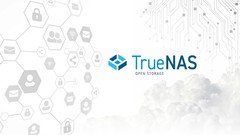Description
In this course, you will learn how to create and configure NAS from scratch. For home, office or for your company and work. Using the specialized operating system TrueNAS (formerly called FreeNAS), you can implement almost all the necessary services for working with data.
Course with examples and assignments from real life:
– Connection and mounting with Windows workstations
– Connection and mounting with servers and computers on Linux
– Connection with cloud services (Dropbox, Google Cloud, Yandex, etc.)
Together we will learn from practical examples how to install and configure TrueNAS. Let’s create and connect RAID arrays, configure replication and monitor the status of hard drives. Let’s learn how to work with pools and clusters. Launch the reporting and logging system.We will set up access rights and security, as well as learn how to work with such a cool thing as iSCSI.
And also create a copy of our own company with a centralized network storage of backups and user data, regardless of their client operating system.
A NAS is a network-attached system that centrally stores data and provides remote access to all authorized users, regardless of the type of client device. NAS systems are highly flexible and scalable, allowing you to add new drives to complement existing drives. NAS is a kind of private cloud for office use. Only it works faster, costs less, makes it possible to locally use all the benefits of the public cloud and at the same time is under the full control of the user.
NAS systems are ideal for small and medium businesses.
- • They are easy to use and often do not even require IT intervention.
- • They are economical.
- • They provide convenient data backup and availability.
- • They effectively cope with the task of centralized, reliable and secure data storage.
With NAS systems, data is always available, which creates conditions for productive collaboration and quick response to requests from customers and potential buyers, since all information is stored in one place. Since NAS systems are like a private cloud, they provide remote access to data over the network, which means that employees can work from anywhere, whenever they want.

